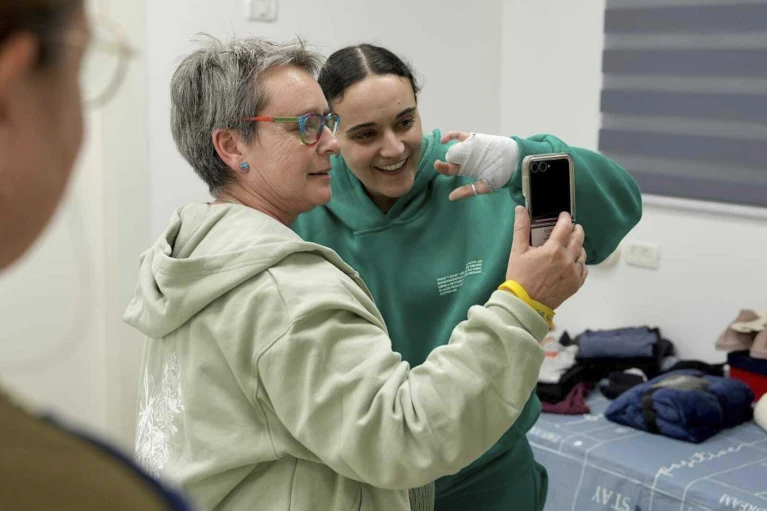Three Israeli hostages were released by Hamas on Sunday, marking the beginning of a six-week ceasefire agreement between Israel and the militant group.
The exchange saw 90 Palestinian detainees freed by Israel as part of the initial phase of the truce.
The hostages, Romi Gonen (24), Doron Steinbrecher (31), and Emily Damari (28), were handed over to the Red Cross in Gaza before being transferred to Israeli forces. The Israeli military confirmed their safe transfer hours after the agreement took effect at 11:15 a.m. local time.
Details of the Release
Footage aired by Al Jazeera showed the women walking between vehicles through Gaza City, escorted by armed men wearing green Hamas headbands. The convoy faced challenges as a massive crowd gathered, many recording the scene on phones.
Israeli citizens gathered in Tel Aviv’s Rabin Square erupted in cheers as the release news broke. “It’s a moment of relief, but we know the road ahead remains uncertain,” one attendee told Haaretz.
The Hostages’ Stories
- Romi Gonen: A 24-year-old choreographer from Kfar Veradim, Gonen, was abducted during the Hamas assault on the Nova music festival on October 7, 2023. Her mother, Meirav Gonen, who had been advocating for her release internationally, described Romi as

Romi Gonen, right, and her mother Merav hold each other near kibbutz Reim, southern Israel, after Romi was released from captivity by Hamas militants in Gaza, Sunday, Jan. 19, 2025. (Israeli Army via AP) - Doron Steinbrecher: A veterinary nurse from Kibbutz Kfar Aza, Steinbrecher was taken from her apartment during the same attack. Her sister, Yamit Ashkenazi, had held onto hope, saying, “As the sun, we will rise again.”

- Emily Damari: A British-Israeli dual national and Tottenham Hotspur fan, Damari was injured in the hand during her capture in Kibbutz Kfar Aza. Her mother, Mandy, expressed cautious optimism, saying, “I just want to hug her. But I won’t believe it until I see it.”

Delays and Ceasefire Terms
The truce, brokered by the United States, Qatar, and Egypt after a year of negotiations, faced a three-hour delay due to what Hamas described as “technical field reasons.” The ceasefire aims to release 33 hostages over 42 days while allowing hundreds of Palestinians to return home.
The deal also enables increased humanitarian aid to Gaza, with hundreds of trucks entering daily, addressing the dire needs of 90% of the displaced population.
Reactions on Both Sides
In Gaza, residents celebrated the ceasefire with hopes of returning to their homes, many of which have been destroyed. Mohamed Abu Taha, who returned to his family home in Rafah, described the devastation: “It’s like a Hollywood horror movie.”
In Israel, reactions were mixed. While many celebrated the return of the hostages, Prime Minister Benjamin Netanyahu faced criticism. National Security Minister Itamar Ben-Gvir’s Jewish Power faction quit the coalition in protest of the ceasefire, though Netanyahu assured that the deal remains intact.
“This agreement provides hope for hostages’ families, but if Hamas fails to deliver, we will act decisively,” Netanyahu warned, reiterating his readiness to resume military action if necessary.
The ceasefire marks the second pause in the 15-month war, following a weeklong truce in November 2023. Negotiations for the next phase, which will focus on the release of additional hostages and sustaining peace, are set to begin in two weeks.



